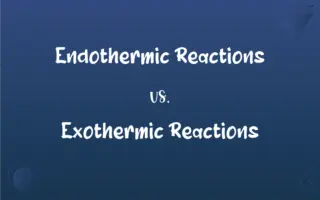Meningitis vs. Encephalitis: What's the Difference?
Edited by Janet White || By Harlon Moss || Updated on October 28, 2023
Meningitis is the inflammation of the protective membranes around the brain and spinal cord, while encephalitis is the inflammation of the brain itself.

Key Differences
In the medical lexicon, meningitis and encephalitis are two terms that describe inflammatory conditions of the central nervous system. Meningitis refers to the inflammation of the meninges, which are the protective layers covering the brain and spinal cord. On the other hand, encephalitis pertains to the inflammation of the brain tissue itself.
Originating from various causes, both bacterial and viral agents can lead to meningitis. Symptoms commonly associated with it include headache, fever, and neck stiffness. Contrarily, encephalitis, which is often due to viral infections, can present with symptoms like fever, headache, seizures, and altered consciousness.
Regarding their diagnosis, lumbar puncture or spinal tap is a typical procedure used to diagnose meningitis by analyzing the cerebrospinal fluid. For encephalitis, in addition to lumbar puncture, brain imaging such as MRI can provide insights into the inflammation's extent and location.
Treatment modalities for these conditions differ as well. Meningitis often requires antibiotics or antiviral medications, depending on its cause. Meanwhile, encephalitis treatment focuses on antiviral medications, though supportive care plays a pivotal role in managing symptoms.
In summary, while meningitis centers on the inflammation of the brain and spinal cord's protective membranes, encephalitis is specifically concerned with inflammation of the brain tissue.
ADVERTISEMENT
Comparison Chart
Affected Area
Meninges (protective layers of the brain and spinal cord)
Brain tissue itself
Common Causes
Bacterial, viral, fungal, or parasitic infections
Mostly viral infections
Diagnostic Procedure
Lumbar puncture (spinal tap)
Lumbar puncture, MRI, CT scans
Typical Symptoms
Headache, fever, neck stiffness
Fever, headache, seizures, altered consciousness
Treatment
Antibiotics or antivirals, based on the cause
Antiviral medications and supportive care
ADVERTISEMENT
Meningitis and Encephalitis Definitions
Meningitis
Inflammation of the meninges.
The patient was diagnosed with meningitis after displaying severe neck stiffness.
Encephalitis
Inflammation of the brain tissue.
The child developed encephalitis after a mosquito-borne viral infection.
Meningitis
A result of infections affecting the brain's protective layers.
Untreated bacterial infections can sometimes lead to meningitis.
Encephalitis
Often caused by viral infections.
Herpes simplex virus is a common cause of encephalitis.
Meningitis
Diagnosed through cerebrospinal fluid analysis.
The doctor ordered a lumbar puncture to confirm the suspicion of meningitis.
Encephalitis
Diagnosis may involve brain imaging techniques.
The MRI confirmed the doctor's suspicion of encephalitis in the patient.
Meningitis
Characterized by symptoms like headache, fever, and neck stiffness.
The sudden onset of a high fever and intense headache raised suspicions of meningitis.
Encephalitis
Can lead to symptoms like seizures and altered consciousness.
The patient's sudden seizure and confusion were indicative of encephalitis.
Meningitis
Potentially life-threatening if not treated promptly.
Immediate medical attention is essential when meningitis is suspected to prevent complications.
Encephalitis
Requires supportive care and, in some cases, antiviral treatment.
The treatment plan for the patient with encephalitis included antiviral medications and monitoring in the ICU.
Meningitis
Inflammation of the meninges of the brain and the spinal cord, most often caused by a bacterial or viral infection and characterized by fever, vomiting, intense headache, and stiff neck.
Encephalitis
Inflammation of the brain.
Encephalitis
(pathology) Inflammation of the brain.
Encephalitis
Inflammation of the brain.
Encephalitis
Inflammation of the brain usually caused by a virus; symptoms include headache and neck pain and drowsiness and nausea and fever (`phrenitis' is no longer in scientific use)
FAQs
Is encephalitis viral?
Encephalitis is most commonly caused by viral infections, though other causes are possible.
How is meningitis diagnosed?
Meningitis is typically diagnosed through a lumbar puncture, analyzing the cerebrospinal fluid.
What is meningitis?
Meningitis is the inflammation of the protective membranes (meninges) covering the brain and spinal cord.
What causes meningitis?
Meningitis can be caused by bacteria, viruses, fungi, or parasites.
Can encephalitis lead to seizures?
Yes, encephalitis can cause symptoms like seizures and altered consciousness.
How is encephalitis treated?
Treatment for encephalitis includes antiviral medications and supportive care.
What are the common symptoms of meningitis?
Symptoms include headache, fever, neck stiffness, and sensitivity to light.
How is the spread of meningitis prevented in close communities?
Good hygiene, vaccinations, and prompt treatment of cases can help prevent spread.
Is meningitis contagious?
Certain types, especially bacterial and viral meningitis, can be contagious.
How quickly does encephalitis progress?
The progression varies, but symptoms can worsen rapidly in acute cases.
What are the complications of encephalitis?
Complications can include cognitive issues, motor problems, seizures, and personality changes.
Are there different forms of meningitis?
Yes, meningitis can be bacterial, viral, fungal, or parasitic, with each having its characteristics.
What viruses cause encephalitis?
Common viruses include herpes simplex, West Nile, and Japanese encephalitis viruses.
How long does it take to recover from encephalitis?
Recovery varies; some recover fully in weeks, while others may experience long-term effects.
Can meningitis be prevented?
Vaccinations are available for some types of meningitis, offering preventive measures.
How does encephalitis differ from meningitis?
Encephalitis is the inflammation of the brain tissue itself, while meningitis affects the meninges.
Can viral meningitis turn into bacterial meningitis?
No, viral and bacterial meningitis are distinct, though their symptoms may overlap.
Who is at risk for meningitis?
While anyone can get meningitis, certain age groups, and those with weakened immune systems are at higher risk.
Is there a vaccine for encephalitis?
Vaccines are available for certain types, like Japanese encephalitis.
How serious is encephalitis?
Encephalitis can be life-threatening and may result in long-term complications if not treated.
About Author
Written by
Harlon MossHarlon is a seasoned quality moderator and accomplished content writer for Difference Wiki. An alumnus of the prestigious University of California, he earned his degree in Computer Science. Leveraging his academic background, Harlon brings a meticulous and informed perspective to his work, ensuring content accuracy and excellence.
Edited by
Janet WhiteJanet White has been an esteemed writer and blogger for Difference Wiki. Holding a Master's degree in Science and Medical Journalism from the prestigious Boston University, she has consistently demonstrated her expertise and passion for her field. When she's not immersed in her work, Janet relishes her time exercising, delving into a good book, and cherishing moments with friends and family.






































































